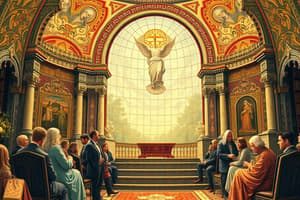Podcast
Questions and Answers
A principal who leads a prayer at a graduation violates the First Amendment's:
A principal who leads a prayer at a graduation violates the First Amendment's:
- Freedom of religion clause
- Lemon test clause
- Free-exercise clause
- Establishment clause (correct)
How might the Elmbrook School District holding graduations at a local church violate the establishment clause?
How might the Elmbrook School District holding graduations at a local church violate the establishment clause?
- The school does not force people to attend graduation.
- The school cannot be associated with any particular religion. (correct)
- The school needed to go to a different church every year.
- The school was not promoting religion by just having a graduation.
A student is praying alone in his public school cafeteria before lunch. This activity is acceptable according to the establishment clause because:
A student is praying alone in his public school cafeteria before lunch. This activity is acceptable according to the establishment clause because:
- The school is not asking the student to pray. (correct)
- Prayer is not allowed in government places.
- Daily prayer is held at some public schools.
- Other students might feel pressured to pray.
The establishment clause would prevent:
The establishment clause would prevent:
An activity passes the 'Lemon Test' if it is:
An activity passes the 'Lemon Test' if it is:
According to the precedent, Santa Fe School District v. Doe, a teacher who allows a student to lead a prayer at a high school baseball game would most likely be ruled:
According to the precedent, Santa Fe School District v. Doe, a teacher who allows a student to lead a prayer at a high school baseball game would most likely be ruled:
What is true of a non-denominational activity?
What is true of a non-denominational activity?
Why was freedom of religion added to the First Amendment?
Why was freedom of religion added to the First Amendment?
In Engel v. Vitale, why did the courts rule that prayer in schools was unconstitutional?
In Engel v. Vitale, why did the courts rule that prayer in schools was unconstitutional?
What is the purpose of the establishment clause?
What is the purpose of the establishment clause?
Study Notes
Freedom of Religion Quiz Notes
- The establishment clause of the First Amendment prohibits government endorsement of religion.
- Schools cannot affiliate with any particular religion, as demonstrated by Elmbrook School District's graduation at a church.
- Individual prayer by students in public schools is permissible if they are not coerced to engage in prayer.
- Government entities, such as the mayor's office, should not display religious symbols like crosses.
- An activity passes the "Lemon Test" if it is secular, neutral, and not entangled with religious institutions.
- In Santa Fe School District v. Doe, allowing student-led prayer at school events was deemed unconstitutional due to the school's affiliation.
- Non-denominational activities do not endorse any particular religion, maintaining neutrality.
- The First Amendment's freedom of religion was established due to colonists' historical persecution for their beliefs.
- The Engel v. Vitale ruling deemed school prayer unconstitutional, categorizing it as a religious activity.
- The primary intent of the establishment clause is to prevent government from favoring or endorsing a specific religion.
Studying That Suits You
Use AI to generate personalized quizzes and flashcards to suit your learning preferences.
Description
Test your knowledge about the First Amendment and the establishment clause through this quiz. Explore crucial court cases and their implications on freedom of religion in educational settings.




